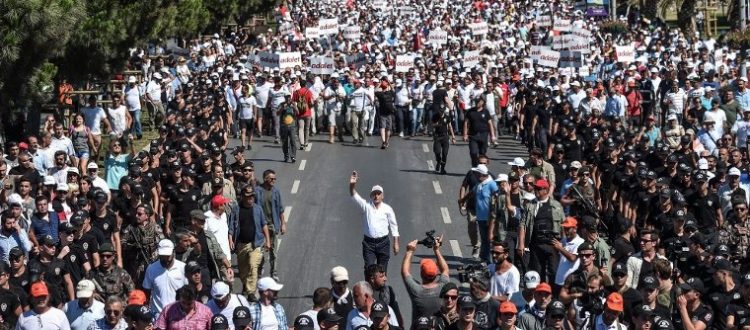Gandhi Kemal’s march for justice
Kemal Kilicdaroglu’s March for Justice is not a first in Turkish political history, but the broad support it received from all sectors of society – from Kurds to the secular middle class – suggests emerging public opposition to Erdogan’s autocratic regime. If the public opposition could translate its democratic demands to effective political action, then we could expect a positive turn in Turkey’s otherwise depressing politics.
| Suggested Reading | Conflict Background | GCCT |
By Dr. Ulas Doga Eralp
Turkey’s main opposition leader, Kemal Kilicdaroglu, is sixty-nine ears old. Kemal, a soft-spoken mild mannered man, has worked for decades as a Public Accountant at the State Social Security Fund, before becoming the center left Republican People’s Party’s (CHP) leader in 2010. Gandhi Kemal has been known for two things in public life; his soft mannerism that often times culminated in inaction and frustrated the pro-democracy front, and his Gandhi looks. This time it was his long March for Justice from Ankara to Istanbul, a 420 kilometre journey following the arrest of Enis Berberoglu, a prominent opposition MP by the authoritarian Erdogan regime. What has started as one man’s seemingly desperate and lonely call for a march for justice ended with a giant political rally of two million people at its final destination.
Why did Kemal walk?
In the aftermath of the failed coup attempt in July 2016, the Erdogan government declared a state of emergency. During this time, 165 journalists, human rights defenders, twelve MPs, tens of elected mayors from the Kurdish South East have been imprisoned, whilst thousands of government workers have been purged on allegations of being part of the Gulen network. There are widespread allegations of systematic torture from the high security prisons; the newspapers are filled with accounts of political prisoners “committing suicide”. The main opposition party remained largely inactive throughout, aside from occasional press statements protesting growing authoritarianism. The April 16th referendum further consolidated Erdogan’s one-man rule. Many cast doubt on the fairness of the results as Erdogan lost all big three cities, plus the youth vote, and yet still somehow won the general vote; a first in Turkish electoral history. Even then Kilicdaroglu refused to call his supporters to the street when the State High Electoral Commission violated its own rules by recognizing faulty ballots as legitimate in order to avoid possible armed clashes with Erdogan’s underground paramilitary forces. However, in mid-June, Enis Berberoglu, a former journalist and current MP, was arrested on charges of espionage after he shared photos of Turkish Secret Service (MIT) delivering arms to Jihadists in Syria. This for some reason became the last straw for Gandhi Kemal; at the night of the arrest, Gandhi Kemal announced that he would walk the 420 kilometres to Istanbul to demand justice for all suffering at the hands of the State of Emergency rule.
Demand for justice
Authoritarian regimes lack the rule of law; as a result, three basic pillars of sustainable peace, truth, justice and peace suffer from distortions of power. Erdogan’s Turkey is no exception to the rule. In the aftermath of his first electoral defeat in June 2015, President Erdogan ended the peace process with the Kurdish militants, and in the aftermath of what many call a controlled coup attempt in July 2016 the Turkish government started cracking down all dissidents reminiscent of the Hitler’s playbook after the Reichstag fire in 1933. Truth has long been lost as Erdogan controls 80% of mainstream media and engaged in the systematic arrest of investigative journalists who looked into allegations of his family corruptions and clandestine armed support to Islamist Jihadist groups in Syria and elsewhere. Civil disobedience has long been a tool against oppressive political systems among the marginalized. Gandhi’s salt march in 1930 against the British, later Martin Luther King’s march to Selma, Alabama in 1965 during the civil right era remain the most memorable examples of peace and justice marches. In 2017, Gandhi Kemal walked 420 kilometres. Kemal Kilicdaroglu’s March for Justice is not a first in Turkish political history, but the broad support it received from all sectors of society – from Kurds to the secular middle class – suggests emerging public opposition to Erdogan’s autocratic regime. If the public opposition could translate its democratic demands to effective political action, then we could expect a positive turn in Turkey’s otherwise depressing politics.
Dr. Ulas Doga Eralp is a scholar and practitioner of international conflict, human rights, development and democratization. He has a PhD from the School for Conflict Analysis and Resolution from George Mason University, and currently works as a Professorial Lecturer at the International Peace and Conflict Resolution Program of the School of International Service (SIS) at American University in Washington, DC.
The views expressed in this article do not necessarily reflect the views of TransConflict.



















